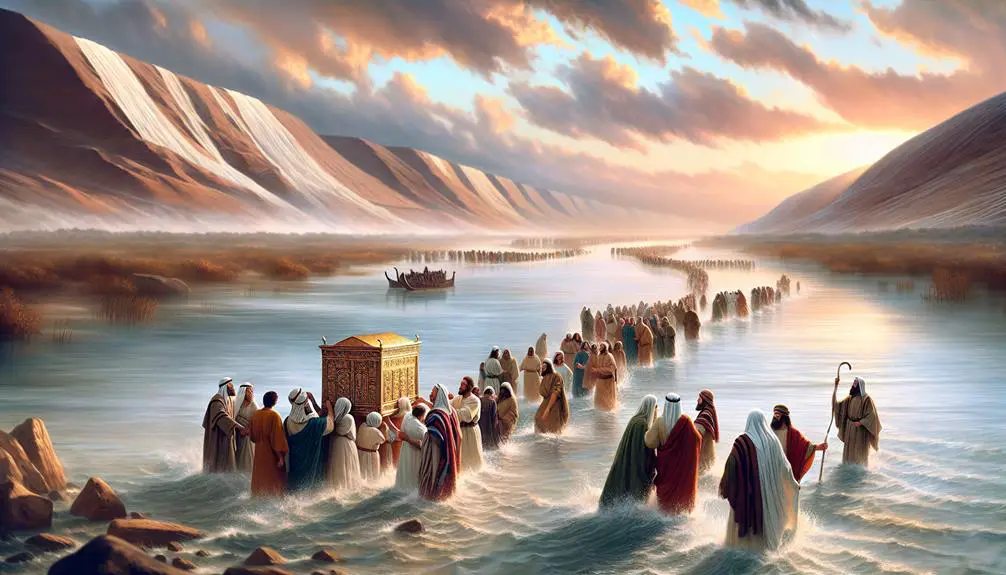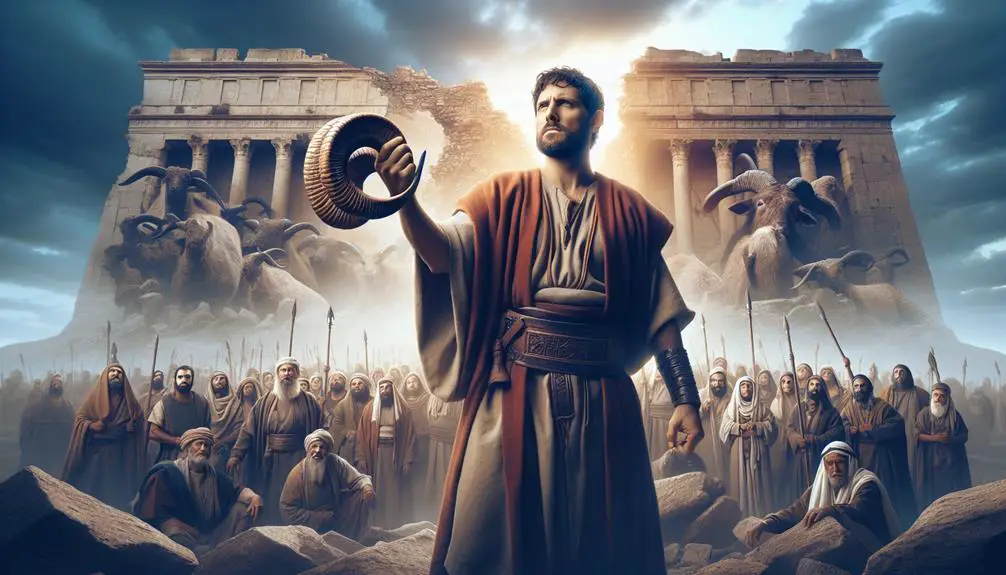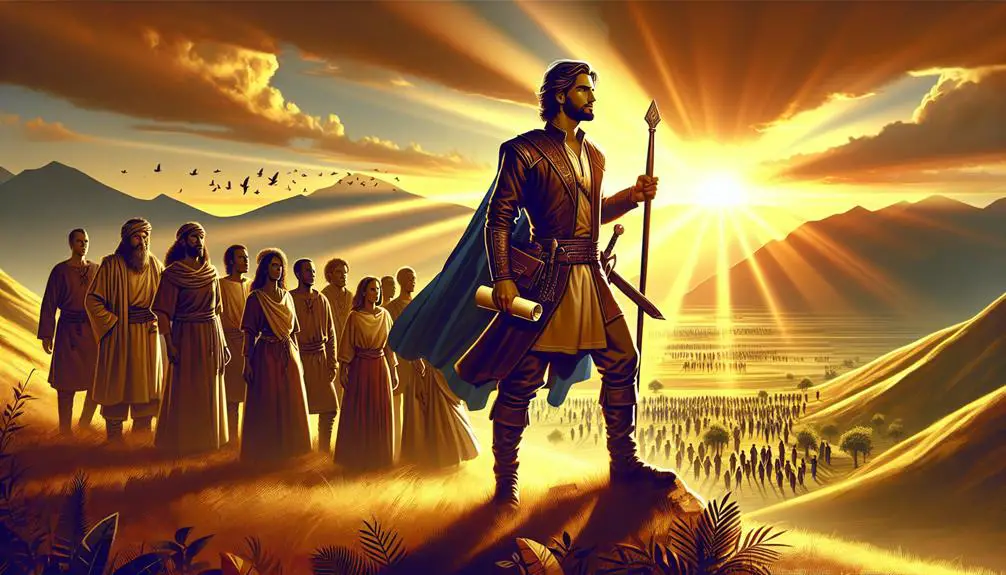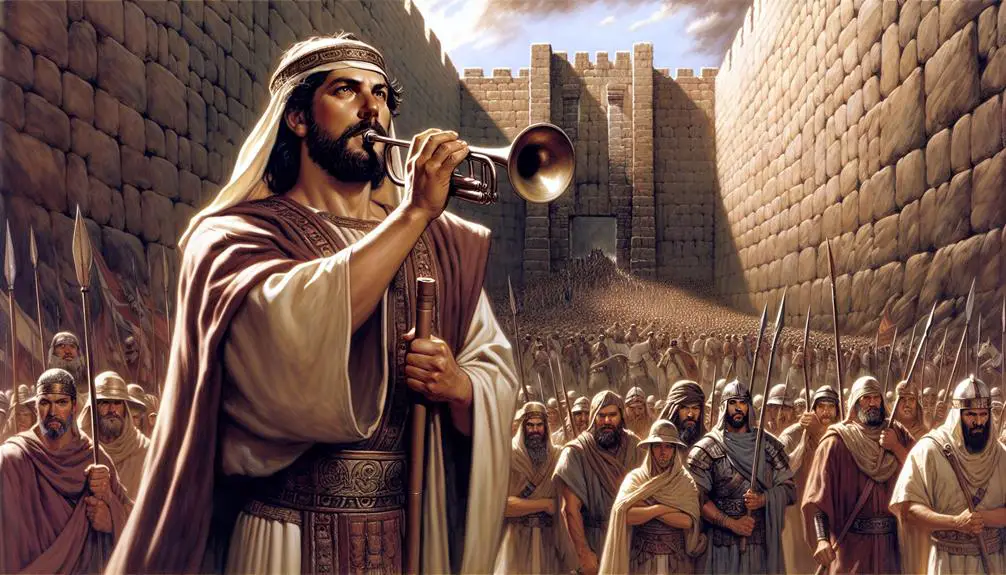Immerse yourself in the story of Joshua, a tale of valor and faith that raises questions about leadership and divine guidance.

Picture of Joshua in the Bible
The biblical narrative presents Joshua as a figure of profound significance, embodying the virtues of leadership, faith, and obedience. From his early inception as a devoted servant under Moses to his pivotal role in the spying mission to Canaan, Joshua's journey is one of remarkable transition and fulfillment.
His strategic acumen during the conquest of Jericho and the subsequent campaigns across the Promised Land not only underscore his military prowess but also his unwavering commitment to divine directives. However, to fully appreciate the multifaceted picture of Joshua, one must consider the underlying themes that weave through his story, revealing insights into his enduring legacy and the broader theological implications.
This exploration invites a deeper examination of a character whose life poses critical reflections on leadership and faithfulness in the face of daunting challenges.
Key Takeaways
- Joshua's leadership was deeply rooted in his mentorship by Moses and his heritage from the tribe of Ephraim.
- His military strategies and intelligence gathering were pivotal in the successful conquest of Canaan.
- Joshua's story is marked by significant divine interventions, symbolizing the Israelites' covenant with God.
- His unwavering faith and obedience underline his prophetic leadership and commitment to covenantal fidelity.
Early Life and Calling

Joshua's early life and calling, as chronicled in the Hebrew Bible, set the foundation for his pivotal role in Israelite history, marked by his transition from Moses' aide to his successor as the leader of the Israelites. Born into the tribe of Ephraim, Joshua's heritage is significant, not only demarcating his lineage but also situating him within the broader narrative of Israel's emergence as a covenant community. This tribal affiliation underscores a continuity of leadership within the Israelite tradition, linking Joshua to Joseph, another prominent Ephraimite figure, thereby enriching the theological and narrative depth of his character.
The mentorship influence of Moses on Joshua is profound and multifaceted, serving not only as a transfer of leadership skills but also as a spiritual and ethical shaping. Under Moses' tutelage, Joshua was groomed for leadership, exposed to the complexities of guiding a nascent nation through wilderness wanderings and into confrontation with their destiny in the Promised Land. This period of apprenticeship under Moses was critical, embedding in Joshua an understanding of Yahweh's laws, the importance of faithfulness, and the necessity of reliance on divine guidance.
Analyzing Joshua's early life and calling through these lenses—his heritage and the mentorship influence of Moses—provides a nuanced understanding of his character. It highlights the deliberate preparation for his eventual leadership role and underscores the continuity and change within Israelite leadership dynamics. Thus, Joshua emerges not merely as Moses' successor but as a distinctive leader shaped by his heritage and mentorship, poised to fulfill his divine calling.
The Spying Mission to Canaan

Transitioning from Joshua's early life and calling, we now explore a pivotal moment in his leadership: the spying mission to Canaan.
This strategic operation, aimed at gathering intelligence on the land promised to the Israelites, underscores the importance of Joshua's covert operations and the subsequent analysis of Canaan's reconnaissance report.
Understanding the implications of this strategy offers insights into the broader narrative of conquest and settlement in the Promised Land.
Joshua's Covert Operations
In an act of strategic intelligence gathering, Joshua dispatched two spies to secretly explore the land of Canaan, marking a pivotal moment in the biblical narrative. This operation, rich in underground tactics, raises questions of espionage ethics within the context of ancient warfare and divine directives.
The mission, executed with utmost discretion, underscored the importance of covert operations in achieving strategic advantages over adversaries. By employing espionage, Joshua not only sought to assess the military strength and morale of Canaan but also to instill confidence within his own ranks.
This episode illustrates the nuanced role of intelligence in historical conflicts, highlighting the tactical necessity of secrecy and the moral complexities inherent in espionage. Through this lens, the narrative offers profound insights into the ancient practice of warfare and the ethical considerations it entails.
Canaan's Reconnaissance Report
Following the clandestine dispatch of two spies into Canaan, their reconnaissance report proved instrumental in informing Joshua's subsequent military strategies. The spies' observations underscored the fertility and potential wealth of the land, exemplified by the Grapes of Eschol—symbolic of Canaan's abundant resources.
However, the report also highlighted significant challenges, notably the presence of Giants, indicating formidable adversaries occupying the territory. This intelligence was critical, providing a balanced perspective on both the opportunities and threats within Canaan.
The detailed account of the land's assets and the formidable nature of its inhabitants offered Joshua a strategic foundation upon which to plan the Israelite incursion. The reconnaissance mission, therefore, played a pivotal role in shaping the approach towards the imminent conquest, balancing optimism with a realistic assessment of the challenges ahead.
Promised Land Strategy
Strategically, the spying mission to Canaan was a critical first step in formulating an effective approach for the Israelites' conquest of the Promised Land. This mission transcended mere reconnaissance, serving as a foundational element in both military and agricultural strategic planning.
The intelligence gathered provided invaluable insights into the military alliances among the Canaanite city-states, revealing potential vulnerabilities and opportunities for the Israelites to exploit. Furthermore, the mission offered a detailed assessment of the land's agricultural potential, informing future agricultural planning and ensuring the sustainability of the Israelite settlement.
Crossing the Jordan River

Following the espionage mission in Canaan, the narrative of Joshua progresses to a pivotal event: the crossing of the Jordan River.
This episode is marked by a miraculous halting of the river's flow, facilitated by the Ark of the Covenant, symbolizing a divine intervention in favor of the Israelites.
It represents not only a physical transition into the Promised Land but also a significant spiritual milestone for the Israelites, underscoring themes of faith and divine guidance.
Miracle at the Jordan
One of the most significant events in Joshua's leadership was the miraculous crossing of the Jordan River, a moment that underscored the divine support for Israel's journey into the Promised Land. This event, characterized by river parting and divine intervention, serves as a pivotal narrative in the Hebrew Bible, illustrating a transition from wilderness wandering to the conquest and settlement phase.
The river parting, much like the Red Sea crossing under Moses, symbolizes not only a physical passage but also a spiritual and covenantal transition, reinforcing the Israelites' identity as God's chosen people. The divine intervention in halting the river's flow highlights the ongoing relationship between the divine and Israel, underscoring the theme of faith and obedience as central to the narrative.
Ark's Role in Crossing
Moving from the miraculous event at the Jordan River, it is essential to examine the critical role of the Ark of the Covenant in facilitating this crossing, highlighting its significance in the narrative. The Ark, central to this event, was not only a religious symbol but also a tangible manifestation of divine presence and guidance. Its design and the Covenant's significance are pivotal in understanding its role.
Feature |
Impact on Crossing |
|---|---|
Ark Design |
Facilitated divine presence and guidance |
Carried by Priests |
Symbolized leadership and divine order |
Covenant Significance |
Embodied God's promises and presence |
River's Halting |
Demonstrated God's control over nature |
Safe Passage |
Ensured a miraculous and protected crossing |
This analysis illustrates the Ark's indispensable role in the crossing, embodying both divine promise and protection.
Entering the Promised Land
The crossing of the Jordan River into the Promised Land signifies a pivotal moment in biblical history, marking the transition from wilderness wandering to the fulfillment of divine promise. This event is not just a historical account but is laden with deep cultural implications and underscored by meticulous ceremonial preparations.
The narrative reflects a communal experience that transcends mere physical relocation, symbolizing a covenantal renewal and a reaffirmation of faith. Ceremonial preparations, including purification rites and offerings, highlight the sanctity of the transition, emphasizing the Israelites' collective commitment to their covenant with God.
These actions serve as a tangible manifestation of the Israelites' spiritual preparedness to enter the Promised Land, underscoring the profound intersection between faith, culture, and divine promise in biblical narratives.
The Conquest of Jericho

In a pivotal moment that highlights both strategic ingenuity and divine intervention, Joshua leads the Israelites in the conquest of Jericho, marking a crucial victory in their quest to claim the Promised Land. This event, narrated in the Book of Joshua, stands out for its miraculous nature and the strategic maneuvering that preceded it, including Rahab's assistance to the Israelite spies. Rahab, a resident of Jericho, provided shelter and crucial intelligence to the Israelites, playing a key role in the city's eventual downfall. Her actions exemplify the complex interplay of faith, allegiance, and survival, further enriching the narrative's multifaceted dimensions.
The wall collapse, a central event in the conquest of Jericho, is depicted as a direct result of divine intervention, following the Israelites' adherence to God's instructions. The methodical encirclement of the city and the subsequent miraculous demolition of its walls underscore a theme recurrent in biblical narratives: the triumph of faith-driven obedience over seemingly insurmountable obstacles. This event does not merely serve as a testament to the power of divine will but also illustrates the strategic acumen embedded within the Israelites' actions under Joshua's leadership.
Analyzing the conquest of Jericho through a scholarly lens necessitates a consideration of its theological, historical, and literary dimensions. The narrative intertwines divine intervention with human agency, offering insights into the ancient Israelites' worldview, their relationship with their deity, and the moral and ethical underpinnings of their military conquests. The fall of Jericho thus emerges not only as a historical milestone but as a profound symbol of faith, strategy, and the quest for a promised destiny.
Leadership and Legacy

Joshua's leadership, characterized by strategic acumen and unwavering faith, established a legacy that transcends mere military conquest, reflecting a profound impact on the Israelite identity and their historical narrative. His mentorship dynamics, particularly with figures such as Caleb, highlight an approach that valued collaboration and the distribution of responsibilities based on trust and proven competence. This, in conjunction with his decision making processes, which often involved direct communication with the divine, set a precedent for leadership that was both spiritually and pragmatically informed.
Aspect of Leadership |
Impact on Legacy |
|---|---|
Strategic Acumen |
Joshua's ability to strategize effectively, especially in battles like Jericho, showcased a level of foresight and adaptability. This has been celebrated in the Israelite history as a model of leadership capable of overcoming formidable challenges. |
Mentorship Dynamics |
By fostering a culture of mentorship, Joshua ensured the continuity of leadership qualities among the Israelites. This has been pivotal in the development of future leaders who aspired to emulate his faith-driven and strategic approach. |
Decision Making Processes |
His unique blend of divine guidance and practical decision-making has been revered as an ideal form of governance. It underscores the importance of a balanced approach to leadership, one that honors tradition and innovation alike. |
Joshua's legacy, therefore, is not merely a narrative of conquest, but a comprehensive blueprint for leadership that values mentorship, strategic planning, and a balanced decision-making process. This legacy has significantly shaped the ethos of leadership within the Israelite community, marking Joshua as a quintessential figure whose impact is measured not just in territorial gains, but in the enduring principles of governance and leadership he instilled.
Faith and Obedience

Central to understanding Joshua's character and his leadership is an examination of his unwavering faith and strict obedience to divine commands. Joshua's narrative in the Bible presents a compelling case study of how faith and obedience are not only virtuous qualities but also foundational to effective leadership, especially within the context of fulfilling divine mandates. His life underscores the potency of divine patience and the critical role of prophetic leadership in navigating through challenges and toward triumphs.
Several aspects of Joshua's faith and obedience illuminate this theme:
- Adherence to Divine Commands: Joshua's meticulous observance of God's instructions, without deviation, exemplifies his obedience. This obedience was not blind but rooted in a deep trust in God's wisdom and timing.
- Courage in Leadership: Stemming from his faith, Joshua's courage to lead the Israelites into unknown territories and against formidable enemies showcases his reliance on divine strength over human capabilities.
- Prophetic Leadership: Joshua's role as a leader was marked by a prophetic dimension—guiding his people not only through physical battles but also on a spiritual journey, emphasizing the importance of covenantal fidelity.
- Manifestation of Divine Patience: Through Joshua's leadership, the narrative demonstrates divine patience, with guidance and provision extended over time, reinforcing the principle that faithful obedience yields divine favor and successful outcomes.
Frequently Asked Questions
How Do Various Religious Traditions Outside of Judaism and Christianity View the Figure of Joshua?
Various religious traditions outside of Judaism and Christianity offer unique viewpoints on the figure of Joshua. Islamic perspectives regard Joshua as a prophet, emphasizing his role in guiding the Israelites post-Moses. His narrative is interwoven with themes of faith and leadership.
Mythological interpretations, on the other hand, might abstract his character into broader archetypes, analyzing his significance in the context of hero myths and spiritual journeys, thus providing a diverse analytical lens on his legacy.
Are There Any Archaeological Findings That Directly Support the Historical Existence of Joshua or the Events Described in the Bible?
Archaeological efforts to validate historical figures from ancient texts have yielded mixed results. Regarding Joshua, there is scant direct archaeological or inscriptional evidence conclusively linked to his existence or the specific events described in biblical narratives.
While some findings suggest a complex socio-political landscape during the supposed time of Joshua, none definitively trace back to Joshua's genealogy. This underscores the challenges in bridging biblical accounts with tangible archaeological records.
How Has Joshua's Military Strategy Been Analyzed or Critiqued by Modern Military Historians?
Modern military historians have scrutinized Joshua's military strategy through the lens of contemporary understanding of battle tactics and leadership principles. Their analyses often highlight the strategic foresight and adaptability displayed in the biblical accounts, juxtaposing ancient maneuver warfare with modern principles of command and control.
Critiques focus on the logistical and ethical implications of such strategies, debating their effectiveness and morality within the context of ancient warfare, thus offering a nuanced examination of historical military leadership.
What Psychological Insights Can Be Derived From Joshua's Leadership Style and Decisions Throughout the Biblical Narrative?
Analyzing the leadership style and decisions of a historical figure without the aid of visual aids may seem like navigating without a compass. However, through an analytical lens, one can discern profound psychological insights.
Leadership resilience and decision-making processes emerge as pivotal themes. Joshua's narrative demonstrates a robust model of resilience, adapting to challenges with strategic decisiveness.
This scholarly exploration underscores the importance of resilience and strategic decision-making in effective leadership.
How Have Artists and Filmmakers Depicted Joshua and His Story Over the Centuries, and What Variations Can Be Seen in These Representations?
Artists and filmmakers have depicted Joshua and his story with notable variations, employing color symbolism and artistic license to convey different aspects of his character and the biblical events.
These representations range from traditional iconography in medieval art to more contemporary interpretations in film and digital media.
The use of color often symbolizes virtue, battle, and divinity, while artistic license allows for creative interpretations that reflect the cultural and historical context of the creators.
Conclusion
In conclusion, the narrative of Joshua in the Hebrew Bible encapsulates the themes of faith, obedience, and leadership within the context of the Israelites' conquest of Canaan.
Through the strategic spying mission, the miraculous crossing of the Jordan River, and the unprecedented conquest of Jericho, Joshua's story underscores the pivotal role of divine guidance and strict adherence to commandments in achieving success.
Coincidentally, these events not only highlight Joshua's unwavering faith and competent leadership but also serve as enduring lessons on the importance of trust and obedience in the face of insurmountable challenges.



Sign up